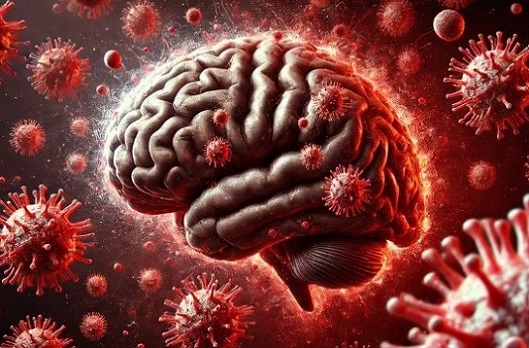Scientists from Maryland Discover That SARS-CoV-2 ORF3a Protein Causes Brain Cell Death!
Nikhil Prasad Fact checked by:Thailand Medical News Team Aug 16, 2025 6 months, 1 week, 1 day, 23 hours, 56 minutes ago
Thailand Medical News: A Hidden Viral Culprit Behind COVID Brain Damage
Researchers from the University of Maryland School of Medicine, University of Maryland College Park, University of Maryland Baltimore, Virginia Polytechnic Institute and State University, and the University of Maryland Medical Center have discovered that a little-known viral protein called ORF3a could be a major driver of brain inflammation and cell death in COVID-19 patients. Their findings shed new light on why some people suffer long-lasting neurological problems after infection.
 Scientists from Maryland Discover That SARS-CoV-2 ORF3a Protein Causes Brain Cell Death
How ORF3a Harms the Brain
Scientists from Maryland Discover That SARS-CoV-2 ORF3a Protein Causes Brain Cell Death
How ORF3a Harms the Brain
COVID-19 is already known to attack not just the lungs but also the brain. In patients with existing neurological issues, the risk of severe complications rises sharply. According to this
Thailand Medical News report, the new study found that ORF3a—a protein embedded in the virus’s membrane—can trigger dangerous changes in brain support cells called astrocytes.
The research team discovered that ORF3a stimulates the overproduction of Sur1-regulated ion channels, which control the flow of calcium into cells. This uncontrolled calcium influx sets off a chain reaction, activating inflammatory pathways and leading to both programmed cell death (apoptosis) and uncontrolled cell rupture (necrosis). The damage is amplified when immune signaling molecules like TNFα and IFNγ are also present.
Evidence from Human Brains and Animal Models
The scientists examined postmortem brain tissue from COVID-19 patients and found high levels of ORF3a, Sur1, and inflammatory markers, especially in astrocytes surrounding blood vessels. Similar patterns were observed in infected mice genetically modified to mimic human susceptibility. The affected astrocytes were swollen, inflamed, and dying—clear signs of severe brain injury.
The Danger of Mutant ORF3a Proteins
The team also studied a mutated version of ORF3a found in Omicron variants (T223I). This mutant protein tended to accumulate in a different part of the cell and caused even more intense inflammation and cell death than the original form. This could help explain why some Omicron infections still lead to serious neurological effects despite the variant being generally less deadly overall.
Possible Treatments from Existing Compounds
In a promising twist, the researchers found that two substances—glibenclamide, an FDA-approved diabetes drug, and glycyrrhizin, a natural compound from licorice root—could block much of ORF3a’s harmful activity in lab experiments. Both reduced Sur1 activity, lowered inflammation, and prevented many astrocytes from dying. When used together, they had an additive protective effect.
Why This Matters
The study reveals that COVID-19’s impact on the
brain is not just a side effect of general illness but may be directly caused by a specific viral protein. By targeting ORF3a or the Sur1 ion channels it activates, doctors might one day prevent or reduce the neurological damage that leaves some survivors with lasting symptoms like brain fog, memory loss, and confusion. While more research is needed—especially to confirm whether these drugs can reach the brain in living patients—the findings open an important new path toward protecting the nervous system from COVID-19.
Conclusion
The discovery of ORF3a’s direct role in killing brain cells and driving inflammation is a major advance in understanding COVID-19’s neurological effects. It also identifies a potential therapeutic target that can be addressed with already available drugs. If these treatments can be shown to work safely in humans, they may help protect vulnerable patients from the long-term cognitive and neurological toll of COVID-19. This breakthrough could change how doctors approach both treatment and prevention of COVID-related brain damage.
The study findings were published in the peer reviewed journal: mBio.
https://journals.asm.org/doi/10.1128/mbio.02012-25
For the latest COVID-19 News, keep on logging to
Thailand Medical News.
Read Also:
https://www.thailandmedical.news/news/sars-cov-2-proteins-found-to-damage-brain-cells-and-trigger-inflammation
https://www.thailandmedical.news/news/how-covid-19-triggers-brain-inflammation-leading-to-dangerous-neurological-conditions
https://www.thailandmedical.news/news/covid-19-triggers-brain-neural-chaos-through-a-piezo2-malfunction
